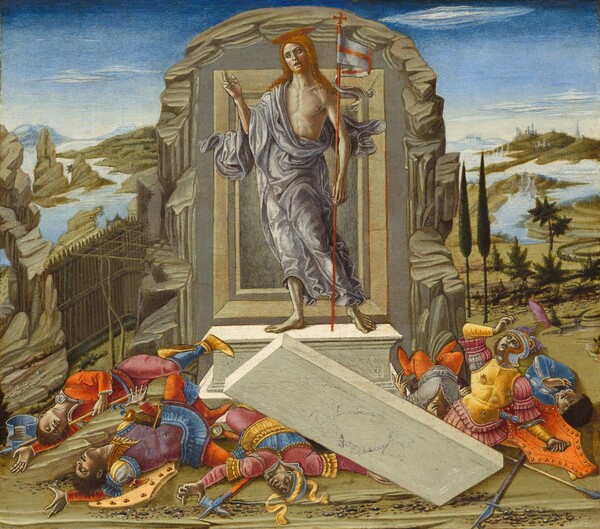Not a word in Scripture suggests that the apostles ever expected a resurrection in any form; on the contrary, they rejected the thought, and were overwhelmed by the actual fact (which might also be explained away “psychologically,” though it is not very probable that an idea so foreign to Jewish religious thought as an incarnate god who retained his corporality in the heavenly state would be Galilean fishermen’s subconscious reaction to depression!). And finally, it should be pointed out that a mere religious experience might be sustained briefly over a period of spiritual torpor, or even for a few dramatic years, but that it never could become the world factor which Christianity today is – factor indissolubly bound to the Resurrection of Christ.
St. Paul – who did not go through the others’ crisis – words it: “For if the dead do not rise, neither has Christ risen; and if Christ has not risen, vain is your faith, for you are still in your sins. Hence they also who have fallen asleep in Christ, have perished. If with this life only in view we have had hope in Christ, we are of all men the most to be pitied.” (I. Cor. 15:17–19)
In other words, with Jesus’ Resurrection stands or falls Christian faith. It is no supplement to that faith, also no mythological development, briefly acquired for historical purposes, to be dropped without danger. It is the center of our religion.
The apostle’s consciousness of this fact leads us back to Jesus himself: What did he have to say about it? Jesus often spoke of his death, particularly on the three special occasions during his last trip to Jerusalem; each time, however, he added that he would rise again. In these declarations the attitude towards death peculiar to Jesus is crystallized.
The death that is valid for us is unknown to him. He knows only death followed by Resurrection: immediate, historical Resurrection. With this we arrive at the supreme but also most difficult task of Christian thought: that of understanding the Lord’s existence. The simplest Christian is given such understanding through participation in the community of grace, through faith and imitation. But what we are aiming at here is conscious, intellectual comprehension, for the mind is also summoned to service for Christ. (A priori is its willingness to submit to Christian “baptism.”)
The problem of understanding the living Jesus Christ and interpreting his consciousness of self is extremely difficult. Two dangers face it: that of falling into purely human psychology, which simply discards all that lies outside its limitations, and that of dogmatizing: of claiming the supernatural without being able to make it apparent.

Only he is really successful who on the one hand never loses touch with the living figure of the Lord, appreciating his humanity at every step; yet on the other, is constantly aware of the fact that this appreciation is at all times subject to explosion by something that is not only the greatness of genius or the dynamism of religious experience, but holy God himself.
The stand Jesus takes to the world is different from ours. His attitude to people is different from that of one person to another. His relation to God is not that of a believer. His consciousness of his own existence, of his living and dying is utterly different from ours, already conditioned by the coming Resurrection.
We are faced with an either-or that reaches to the bottom of existence. If we take ourselves as measuring-rod, our human lives, the world as it appears to us, our thoughts and reactions and attempt to judge Christ by them, can only conclude that the Resurrection was either the psychological result of a religious shock, or the product of a primitive community’s desire for a cult.
In other words, individual or mass self-deception. Then logic demands that this whole chapter of Jesus’ life, with all its conditions and conclusions, be eliminated as swiftly as possible and a “pure” Christianity formulated. Admittedly, what remains will be little more than very thin ethics and piety. This is one possibility.
The alternative is to realize in our own lives what Christ’s whole existence demands: faith. Then we understand that he did not come to bring us new but world-born truths and experiences, but to free us from the spell which the world has cast over us.
This means that we hear and accept his demands; that we measure him by the standards he himself has taught us; that we know, once and forever, that he was not born to further this existence, but that a new existence was born in him.
Thus we accomplish the complete reversal of faith, which no longer judges Christ with worldly eyes, but sees the world and everything in and around it with his eyes. Then we do not say: There is no such thing as the return to life of one who has died; therefore the Resurrection is a myth, but: Christ rose again; therefore resurrection is possible, and his Resurrection is the foundation of the true world. – Excerpted from “The Lord.”
*Image: The Resurrection by Benvenuto di Giovanni, c. 1491 [National Gallery, Washington, DC]














